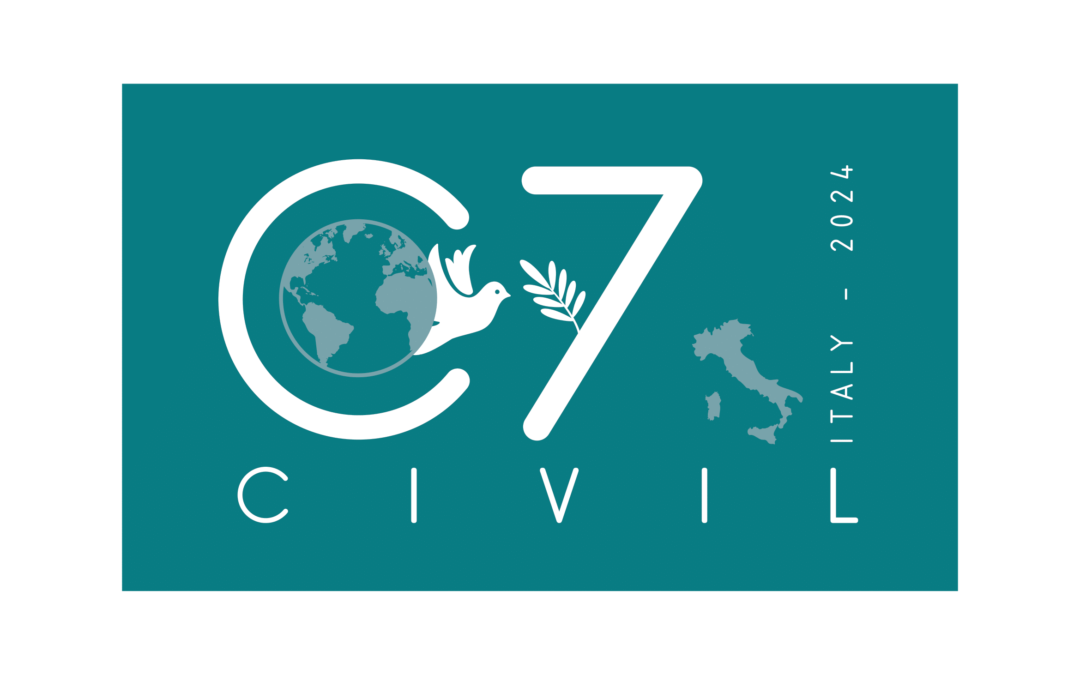Inequalities, wars and hunger: civil society’s recipes for the Italian G7

In conversation with Valeria Emmi, Sherpa of Civil7, a coalition of over 700 organisations from around 70 countries. For the non-governmental world, the only way out of the crises is to recover multilateralism, returning a central role to the United Nations.
25 Jan , 2024 Gabriele Carchella
This article was published in Lettera22
A white dove flying towards an olive branch. Behind it a planet with the poles reversed: south above and north below. The logo chosen by Civil7 – a coalition of over 700 civil society organisations from around 70 countries -, summarises in a simple but effective way the objectives of the non-governmental world in a period marked by wars and growing inequalities. In view of the Italian presidency of the G7, scheduled to take place this year from 13 to 15 June in Puglia, Civil7 has begun its work in recent days to bring civil society’s proposals to the table of the seven greats in a stubborn attempt to put dialogue back at the centre and relaunch multilateralism. We spoke about this with Valeria Emmi of CESVI, an organisation belonging to the Link 2007 network, who is acting as sherpa for Civil7 2024.
Economic and social inequalities have been steadily increasing for years. What can be done to really reverse this trend?
“The issue of inequality is central for us. The real issue is that inequalities have always been there. What we are registering, and what the latest Oxfam report confirms, is that this gap between the rich few and the vast majority of the vulnerable is increasing sharply. We propose a systemic vision and immediate, urgent yet bold and ambitious actions. It is not possible to break down inequality with one specific action. It must be done through the combination of several actions, putting human rights, people and especially the most vulnerable at the centre. Among these actions are combating climate change and protecting biodiversity, respecting the commitments made at Cop28. We must also ensure universal access to public health and prevent future pandemics with a systemic One Health approach. We must then work on the link between development and migration, ensuring that migration becomes an element of strong development and partnership between the global south and global north, and combat food crises by transforming production systems. All this while trying to promote peace processes, a coveted peace that must be pursued as a founding element to break down violence and inequalities’.
Speaking of peace, so far mediation attempts to end the ongoing wars in Ukraine and Gaza have failed. What demands will you bring to the G7 to promote a diplomatic solution?
“The growing wars are also cause and effect of the crises I mentioned: food, climate, migration, etc. More than giving directions, we want to open a dialogue that allows us to share our experience rooted in the territories. Humanitarian needs linked to conflicts and wars have increased. This is the first element. It is no coincidence that there is a specific Civil7 working group dealing with humanitarian assistance and its principles, always with a view to promoting actions to influence the structural causes of these wars. As on all other issues, we will make precise proposals to influence future G7 peace commitments, while at the same time stimulating the summit to give impetus to the multilateral process. As important as these forums are, we cannot consider the G7 and G20 as the world government. In order to reverse this development model, which has only led to inequalities, we need to stimulate a decision-making process that leads to peace agreements within the multilateral system, and therefore within the United Nations, where all states are represented’.
With the growth of the Brics and the emergence of new international alliances, the G7 seems an outdated instrument. Is it time to support a new idea of governance?
“There is no doubt that these are exclusive summits, even though they represent forces and powers that have a global impact. That is why the intention of the whole civil society, both in Civil7 and Civil20, is to create a dialogue so that the Seven and Twenty can provide impetus to the multilateral system. The centrality of these places is there, as is the will to substantiate a dialogue. We have already received the willingness of the Italian government to listen to our requests and work jointly to ensure that the decisions taken serve the global population and preserve an all-round sustainable future’.
The distinction between public and private, even at the level of large agencies such as the WHO, Ema and Efsa is increasingly opaque, with major consequences for global policies. How can this trend be curbed?
“We have to start from the realisation that there is an increasing incidence of the private sector in decisions and policies that must remain public. However, we believe that there can be a fruitful partnership between the public and the private sector that goes in the direction of preserving and guaranteeing human rights. That said, the private sector cannot replace the responsibility of a global welfare system that must be preserved. Public resources must be preserved, as must universal access to services. Commercial and economic rules cannot determine policies. On this the position of civil society is very firm, but a partnership that pursues the common good is not bad per se’.
(Pictured are Riccardo Moro, C7 Chair and Co-spokesperson for GCAP Italy-LVIA and Valeria Emmi, Civil7 2024 Sherpa).
